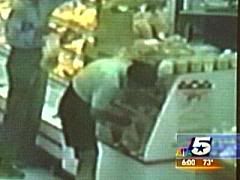The State vs. Behrouz Nahidmobarekeh
You probably have heard of this case, it was nationally covered. The judge called the case "raunchy, repugnant, repulsive, vile, and vulgar". And "you can't put lipstick on this pig". And the most bizarre case he has tried in 17 years. He judges a lot of felonies and deals with media, but he was not used to national coverage.
What you don't know is that you are reading a statement from the foreman on the case. You can see the courts notes in text form here (or in the original pdf).
- Defendant spreading material on bread:

- On donuts:

- On cookies (note the ridiculous cut-offs, one leg is 6 inches longer than the other):

- Defendant's confession:

It may on the surface look to be a slam dunk case. Did the defendant "tamper" with comsumer products? Absolutely. BUT, to _legally_ qualify for a tampering charge the outcome must include a PROBABILITY of serious bodily injury (SBI). Which means that it must "probably" cause 1) death; 2) risk of death; 3) disfigurement; or 4) long term loss of use of a bodily member or organ.
The defense was brilliant. It argued that from the testing results, there was no e.coli, salmonella, listeria, or other disease causing agents except gram positive cocchi. The prosecution called a chief epidemiologist and the defense got him to write on paper a statement : "Consuption of non-toxin e.coli is possibly able to cause serious injury, but is not probable".
None was found and this hurt the prosecution.
The prosecution called the arresting patrol officer to the stand. The officer is the one who chooses the charge. Not only does he write the charge, but he has to do so that day before incarcerating the individual. When the officer testified, he was unsure of what it meant legally to "tamper" with a consumer product. Including the SBI clause. The charge is rare indeed. And when showed the criminal code by the defense, he pointed to clause C. But clause C covers _threats_ of tampering. Kind of like yelling "fire" in a crowded theater. This was not applicable. The defense, in light of the testing evidence, said that his client was more likely to be charged with criminal misconduct including the lesser "bodily injury" instead of the felony "serious bodily injury".
This hurt the prosecution.
The state rested and the defense called a professor of pathology.
He testified that the drying of the fecal matter reduces the live bacteria. In his opinion it is "highly unlikely" that the substance on the bakery items would cause "serious bodily injury".
This also hurt the prosecution. Later the prosecuting attorneys said they were "sweating bullets" during deliberations.
Deliberations : we took an initial vote of guilt. Only about 4 jurors raised their hands. This does not mean that 8 jurors thought the defendant was innocent, but that more deliberations were needed. Some of the jury members had personal knowledge of 1) homes for the elderly and handicapped in the immediate vicinity of the store; and 2) stores that had been responded to by the health department because of failed water supply and employee food handlers could not wash their hands. Which was not a contamination issue, but a *threat* of contamination.
We found that the state, through testing, had not supplied evidence of e.coli, salmonella, or listeria. BUT the sequence of events had only supplied opportunity to test a small sample from 1 of the 2 occurances (the July 24th incident and not the July 13th incident) and that the state HAD proved the substance was fecal matter (by the defendant's own confession). And also, if the state COULD have tested 100% of the substance that remained in the store, it could NOT have tested the substance that was on baked goods that were actually purchased or consumed. And it could not have tested anything from the first (July 13th) contamination.
Therefore we found it sufficient that the state proved that the material was fecal matter and was probable to cause SBI. We did not decide guilt on a "gross out" factor. We also found that _despite_ the lack of e.coli, salmonella, or listeria; 2 expert witnesses testified that they could only test for the higher profile contaminates and that those tests only "SCRATCHED THE SURFACE" of possible harmful bacteria.
Guilty verdict rendered.
The state could now show evidence outside the boundaries of this case. It called a patrol officer who stopped the defendant in a known drug area after running their patrol car off the road, running a stop sign, and almost hitting an oncoming car. The defendant was found to be carrying a 12" knife with a 7" blade. He claimed to have been carring it for protection. He later admitted that on several occasions he would pull into a gas station at night and not like the "look" of the people there. So he took the knife and hid it in his sleeve while filling up.
The defendant then took the stand after warnings by his attorney not to do so. Although a defendant cannot "address" a jury and can only speak in a QA forum, the defendant often overspoke his attorney and the state attorneys. It was clear that he was arrogant and thought he could talk his way out of jail time. He made many damming statements. He also showed that he lacked a clear view of reality. Here is a short list of some of the things he said:
- He considered himself to be an "educated" man, despite flunking out of a community college. He was initially here on a student visa. He is not enlightened nor educated.
- He said that even while on drugs he would never hurt anyone. And now that he was clean he would not hurt anyone. He has clearly forgotten the incident where he ran the police off the road and almost hit an oncoming car.
- He was the oldest cabby and not getting many "trips". Everyone else was earning more than him. He saw other people with big houses and big mortgages that he could not afford. He seemed resentful about that. Yet he was spending every bit of his earnings on drugs, living "hand to mouth" as it were.
- He thought people were laughing at him, insulting him, and leaving him out of things. He also heard voices. Paranoia is a common in this type of drug user. He was so paranoid that we doubted wether the "insult" event at the store was real or imagined. Even if it was real, he would have been high, drunk, or both; and probably belligerent.
- When his cab was in the garage, he could not drive to make drug money and would experience withdrawals. One of the symptoms of withdrawl is diarrhea. He did not have a bathroom close to his room and would defecate on newspapers. During one withdrawl bout after the "insult" at the store, he looked at the feces on the paper and hatched his plan. From the pictures of his room, his bed roll (or maybe sleeping bag) was only inches away from his "bathroom" newspapers.
- He did this to "scare them good", "get even", "get back at them", "teach them a lesson", and "to insult them".
- He repeatedly tried to justify his actions, which was obviously his goal on the stand. He admitted to accidently eating his own feces and it "was not that bad". One night he had been doing drugs and drinking and urinating into bottles (remember no bathroom). He got mixed up and drank from the wrong bottle. Therefore he didn't think it would be "harmful" to anyone.
- He said, "if I wanted to harm, I am a cabby with access to back of airport ...". At which time the defense quickly and smartly stopped his testimony.
- The defendant experimented with but did not prefer marijuana. It did not let him "concentrate while driving" like heroine, coke, and crack did. So he could do drugs and drive at the same time. The state pressed him on this point, "So you did drugs while driving?". Defendant: "Yes".
- The state asked him to demonstrate how he grated the feces. He took 2 evidence bags, one with the feces and one with the grater. He pantomimed the action, said he would dump the grated feces in his hand, cup it, and say to himself "now let me go get even with them". The only time he smiled or smirked on the stand was during this demonstration.
The defendant was very calculating. It took days to think out the plan. The states words where "after 4 days his blood was boiling". By the defendant's own words, he had to "act natural" when entering the store. After his arrest for the knife he switched to a bat sized club because, if an incident ever occured, he did not want a "big event". He calculated the effects of marijuana vs. the other drugs. To quote the judge, he was "raunchy, repugnant, repulsive, vile, and vulgar". And "you can't put lipstick on this pig".
Despite his arrogance and damming testimony, this man was sane and fit for trial. Just ignorant, insipid, stupid, and clueless.
I am making this statement because the defendant intends to appeal. IF this ever makes it back to trial, and in retrospect, we should have put community supervision on the first charge and 10 years on the second charge. The news said "the jury made a mistake". That is not entirely true. We asked the court if the sentence would be concurrent or consecutive. We got the stock answer, "You have all the law in front of you that you need. Please continue to deliberate". We later asked the state attorneys to in the future indicate how the sentences will be served so that jurys can _know_ that what they intend will be carried out.
However, I do not think the resulting concurrent 5 year sentence is a bad one. The range of punishment is 2-20 years. In cases where victims could be produced, that would lend to the 20 year side. The cases where lethal toxins could be proved would lend to the 10 year side. So 5 years is not bad. PLUS, this man only had a couple of misdemeanors and now he is a felon. His main source of income was driving a cab. I would guess that a felon cannot get a commercial drivers license. If the inmates in his prison find out his crime, he will be defending himself for the next 5 years.
I mentioned a couple of times that his defense was either smart or brilliant. In the appeal process, if it is found that the defendant did not receive adequate representation or a fair trial, the decision would be overturned. We meet with all the attorneys including the defense. The defense attorney was very nice and a good friend of the court. He did not want the case, but once assigned as the public defence, he did a bang up job. Everybody is entitled to a fair trial and the defendant GOT a fair trial.
Bottom line, our system works. Mr. Nahidmobarekeh, accept your sentence and be thankful that the system even allows for "concurrent" sentences. Let it go.
posted by iWantToKeepAnon at 5:39 PM |



 Blogshare Listed
Blogshare Listed

"If the poop don't make you sick, you must aquit."
But I just thought of this one the other day (based on his 5 yr. sentence):
"Mr. Nahidmobarekeh may not have a grip on reality, but now reality has a grip on him."
:-)